Archive for the ‘bowl/dish’ Category
Saturday, July 30th, 2016
This Chinese bowl, which measures 2.75 inches high and 5.75 inches diameter, is decorated with flowers, pagodas, and bridges in the Japanese Imari style and palette. It was made for export to Europe in the early to mid 1700s with just the blue underglaze decoration, but soon after arriving, it was overpainted in red and gold to keep up with the public’s new demand for colorful porcelain. This method of overpainting is often referred to as clobbering.
You may wonder why I am featuring a bowl that appears to have had its broken halves merely glued together. But the “Mifs Cox” red mark on the underside – she was most likely the original owner of the bowl – gives insight into how the bowl was repaired. An early form of ceramic repair practiced in England during the late 1700s to middle 1800s was called “china burning,” in which broken ceramics were re-fired at a low temperature, causing the broken pieces to fuse together. The most renowned china burner was Edward Combes of Queen Street, Bristol, who signed his pieces on the underside in red script, similarly to the mark on this bowl. I have a few examples of pieces repaired and signed by Combes and will post them in the coming months.
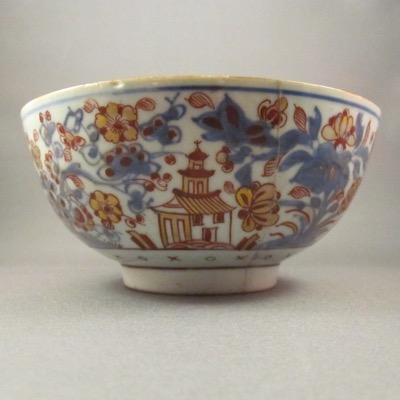
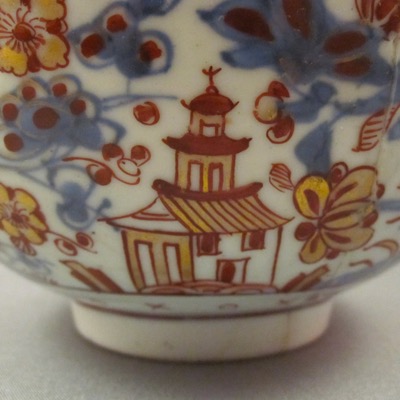
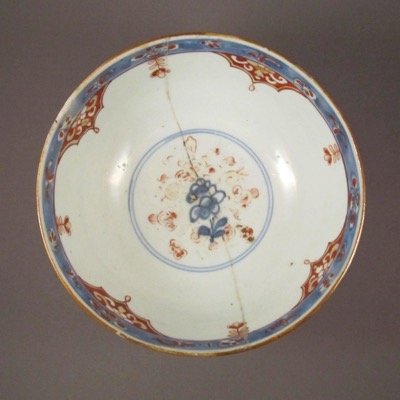
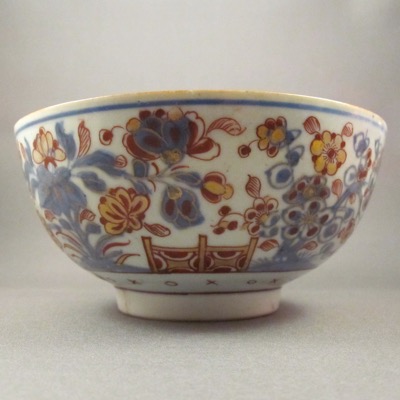
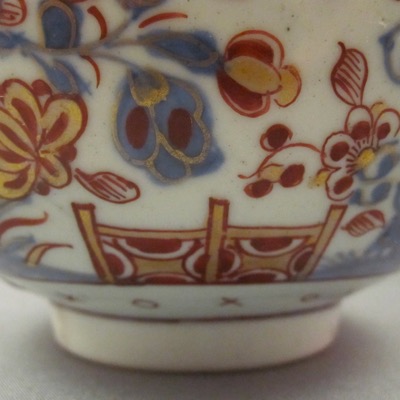
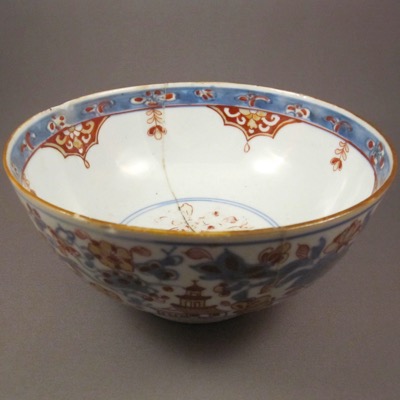




Tags:Chinese, clobbered, porcelain
Posted in bowl/dish | 3 Comments »
Saturday, June 11th, 2016
In the small hamlet of Cummington, Massachusetts, home of the esteemed ceramics gallery Ferrin Contemporary, sits the Kingman Tavern Museum, a small historical museum overflowing with antiques of local interest, donated mainly by the town’s residents. The collection includes a full scale replica of an early 1900s country store, miniature rooms by artist Alice Steele, and vintage clothes, tools, and household items. Among them is a curious set of porcelain plates riddled with early staple repairs.
On a shelf sitting alongside a handful of innocuous-looking plates and tableware are two stacks of thick walled bowls and platters, each with pronounced staple repairs. The cobalt blue stylized rabbit pattern is unfamiliar to me but appears to be American, late 19th century, and perhaps restaurant china. No one associated with the museum seems to know anything about the set or how they got there. If anyone recognizes the pattern please let me know and help solve this mystery!
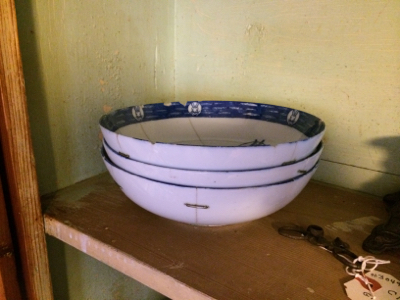
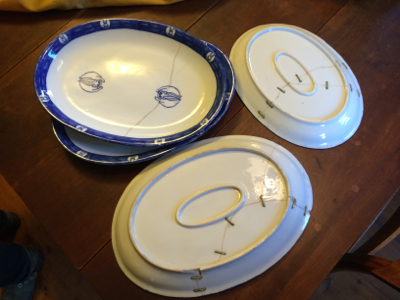
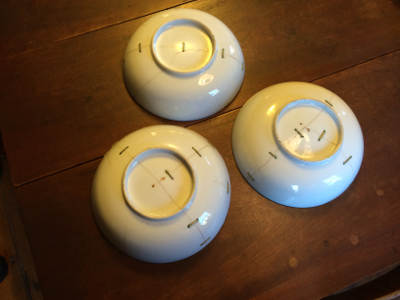
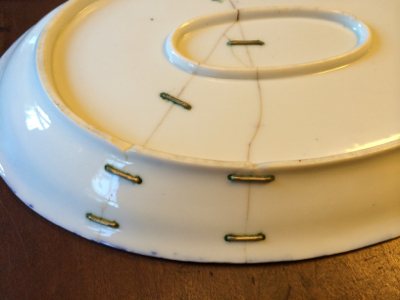
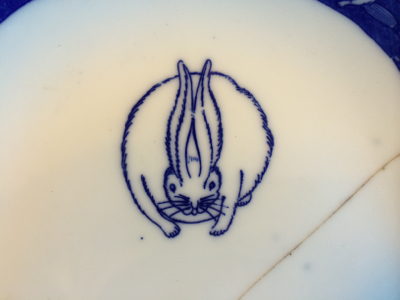
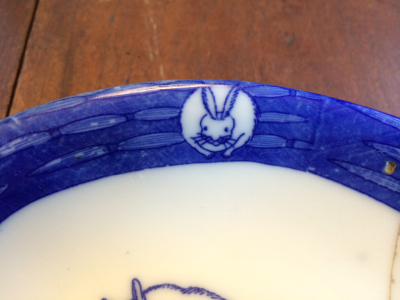
Tags:blue & white, porcelain, staples/rivets
Posted in anecdotal, bowl/dish, plate/platter | No Comments »
Sunday, May 22nd, 2016
This English pottery covered vegetable dish measures 12.5 inches by 10.25 inches and has brown transfer decoration of Greek buildings, urns, and classical figures. Although a potter has yet to be confirmed, there is speculation that it may have been made by Hicks, Meigh, & Johnson in Shelton, Staffordshire, between 1822 and 1835. It is marked on the underside “ANTIQUES, Stone China”.
When the original handle on the cover broke off, a tinker made this chunky iron replacement. Although it in no way matches the elegance of the original handle, this sturdy repair allowed for the cover to function once again.
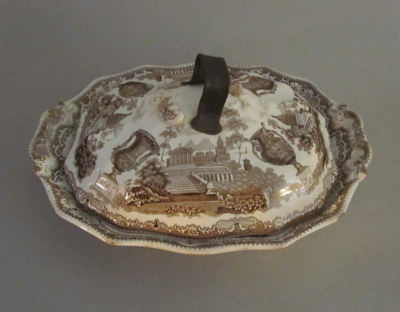

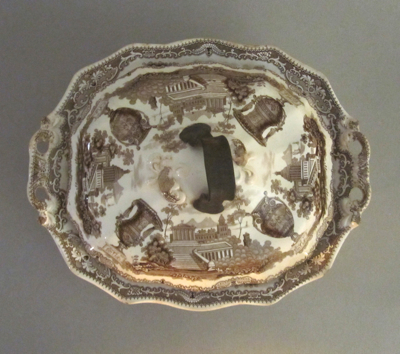
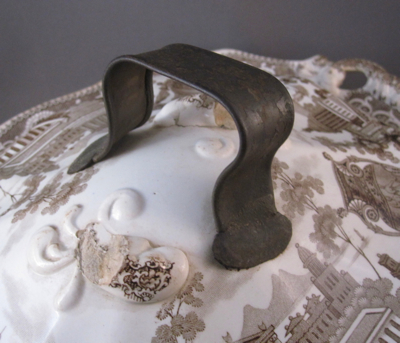
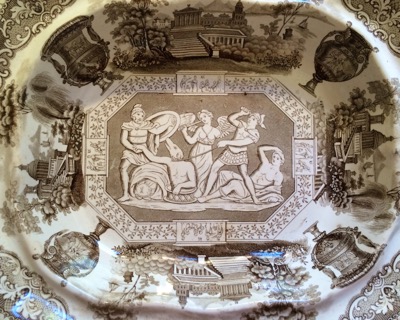
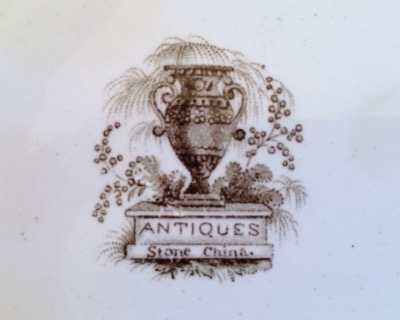
This covered dish with similar form shows what the original handle on mine might have looked like.
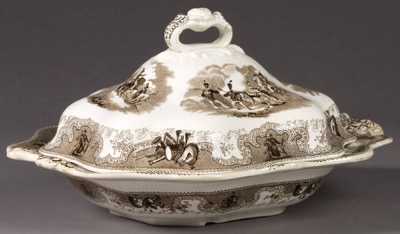
Photo courtesy of Antiques Image Archive
Tags:English, metal handle, transferware
Posted in bowl/dish | 1 Comment »
Sunday, June 14th, 2015
I purchased this unmarked soft-paste teabowl from an antique ceramics dealer in the UK who appreciates early repairs and has provided me with many interesting examples of make-do repairs over the years. This piece was made by Philip Christian Liverpool Porcelain, c.1765-70, and measures 1-3/4 inches high x 3 inches diameter. It has a fluted body with molded leaves and flowers, a cobalt blue underglaze border of leaves and berries, and a flower motif painted on the inside.
This delicate teabowl boasts multiple repairs done by a 19th century “china mender.” After the bowl broke, a large chip was reattached using tightly bound brass wire wrapped around holes drilled through the body, appearing at first like more commonly used staple repairs. A large blob of lead was applied to the center of the crack, acting as an anchoring rivet. A smaller chip along the rim, perhaps lost or too small to repair, has been replaced with a thin sliver of porcelain decorated with iron-red scrollwork from another piece entirely. This type of repair, using thin wire instead of metal staples, is typically associated with 19th century repair work done in Belgium and the South of France.
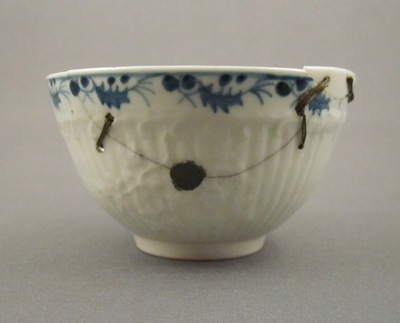
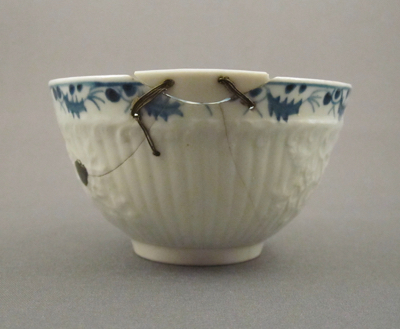
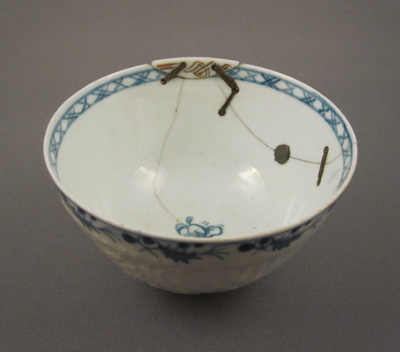
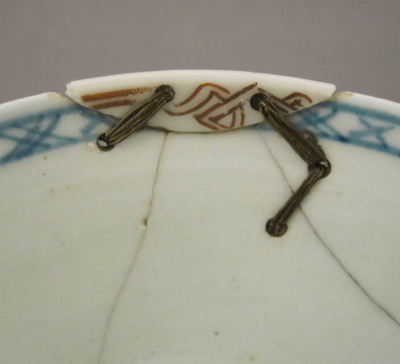
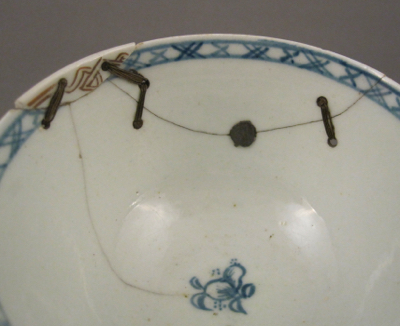
Below is a “perfect” example with matching saucer.
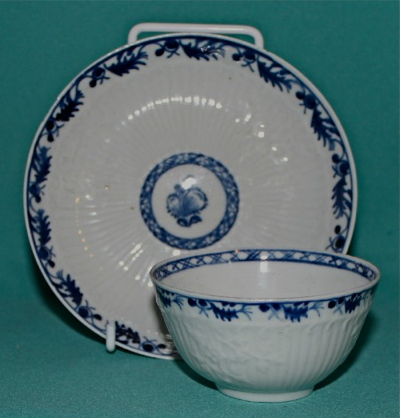
Photo courtesy of Antique Porcelain Online
Tags:blue & white, English, patch, porcelain, soft paste, wire
Posted in bowl/dish | 2 Comments »
Sunday, December 21st, 2014
Wishing you all the best during the holiday season and for a healthy and Happy New Year!
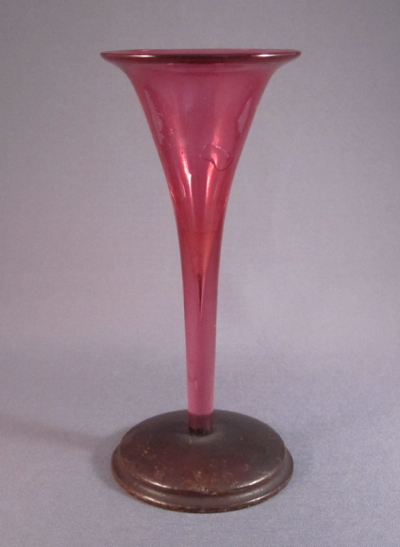
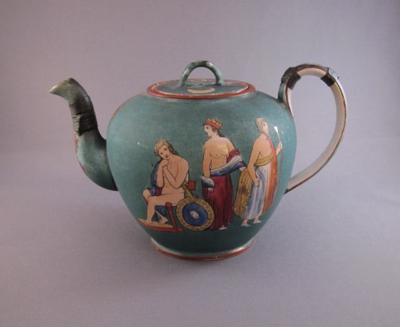
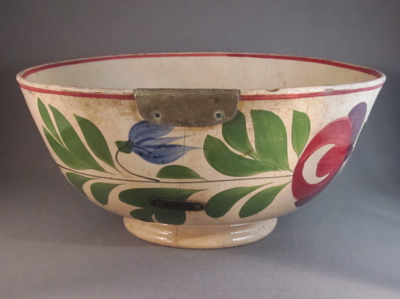
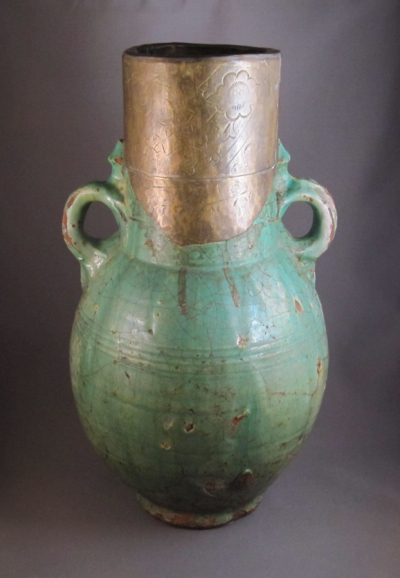
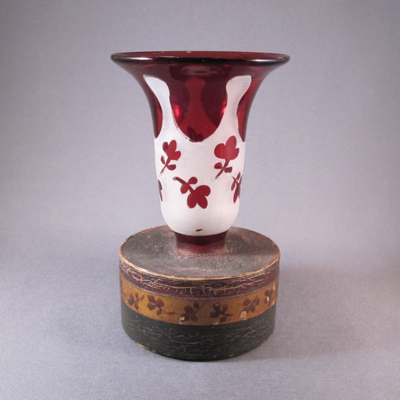
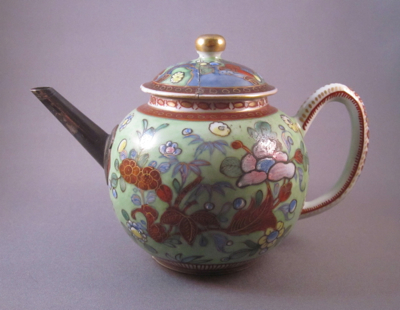
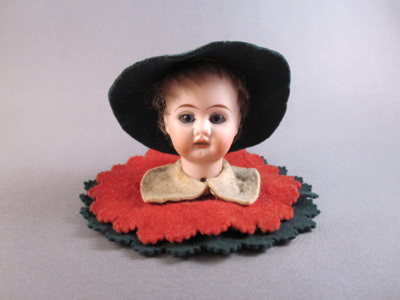
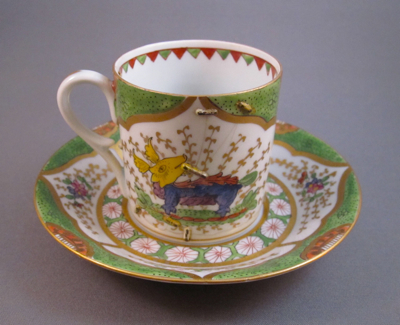
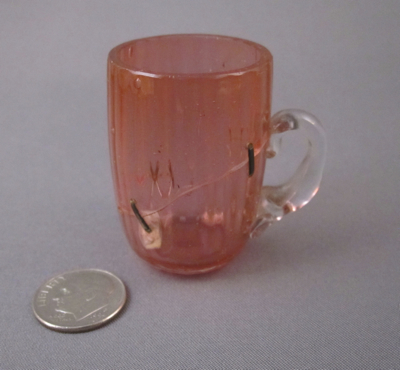
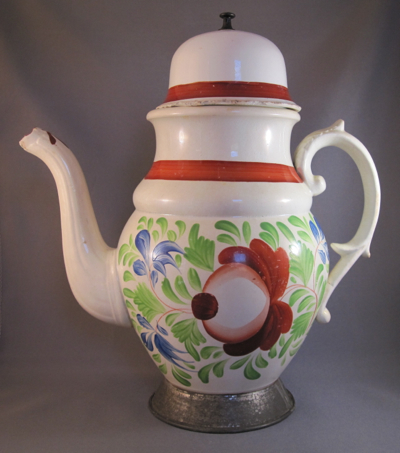
Tags:Chinese, clobbered, English, German, glass, globular, metal base, miniature, porcelain, pottery, silver, staples/rivets, wood base
Posted in bowl/dish, chocolate/coffee pot, cup/saucer, jug, plate/platter, teapot, toy, vase/vessel | 8 Comments »
Sunday, September 1st, 2013
This porcelain bowl was made in China during the Jiaqing period (1796-1820) and measures 2-3/4″ tall, 6-7/8″ in diameter. It is decorated with scrolling lotus blossoms in cobalt blue underglaze “pencil drawn” decoration, a style using cross hatched lines instead of color washes to show shading. It has a blue seal mark on the bottom, as well as an early collector’s inventory label.
At first glance this fine bowl appears unscathed, dare I say “perfect,” showing no noticeable sign of damage or repair. But upon closer inspection, one can see a subtle yet most effective inventive repair. Over 150 years ago when the bowl dropped and broke in half, two simple bronze bands were attached, one along the top rim and the other encircling the base, holding the broken pieces tightly together. Due to the exceptional quality of the repair, I believe a skilled 19th century jeweler was responsible for this delicate work, as the top band’s thickness is an incredible 2/16″ with invisible seams. But most amazingly, not a drop of glue was used to mend this bowl.
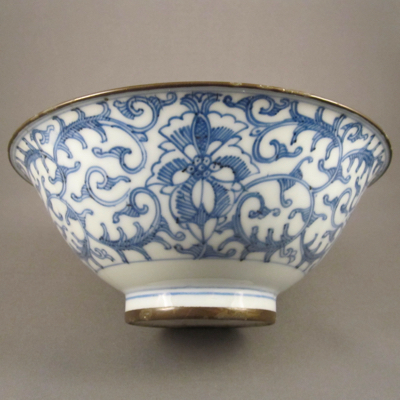
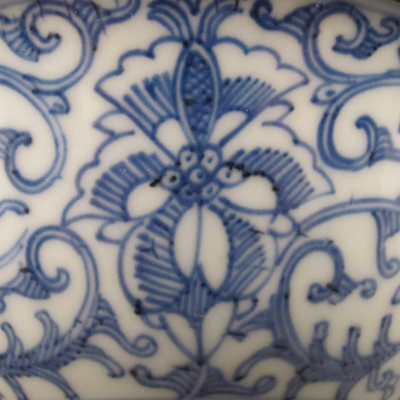
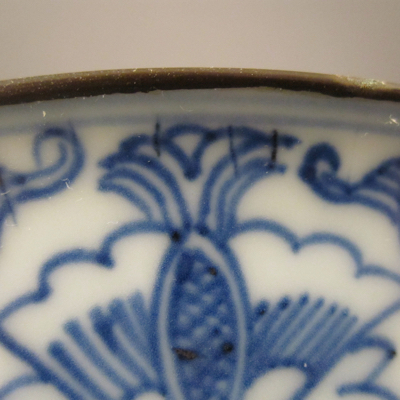
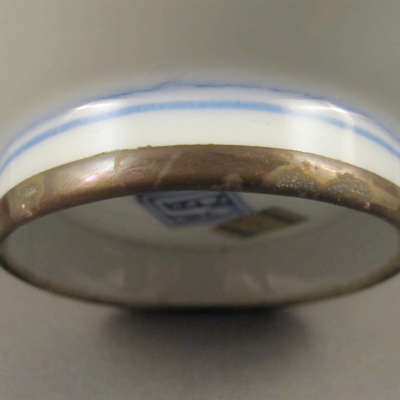
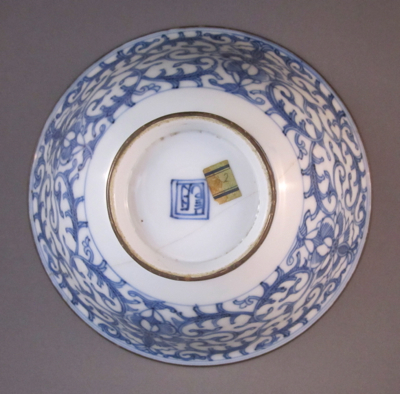
Tags:blue & white, bronze, Chinese, porcelain
Posted in bowl/dish | 2 Comments »
Thursday, December 1st, 2011
I have never seen another repair quite like this. The porcelain bowl itself is fine but unremarkable: made in China in the mid-1700’s for export to North America and Europe, decorated in Famille Rose enamels with large stylized flowers and cobalt blue underglaze leaves.
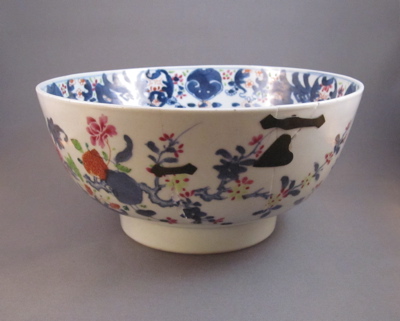
But what makes this piece truly remarkable are the figural repairs. Rather than using standard metal staples or straps to join the broken pieces of the bowl, an inspired metalsmith cut three different shapes to form a unique bond. An unmistakeable heart-shaped brace sits below a strap shaped like a scepter. Each of these has short metal pins attached, which pass through small holes drilled into the side of the bowl.
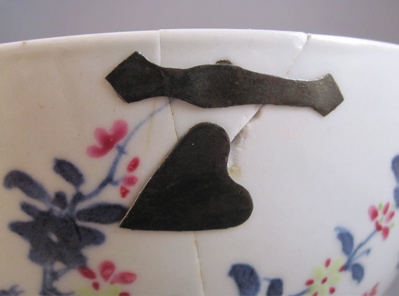
This short metal strap, straddling a crack, resembles a bow tie.
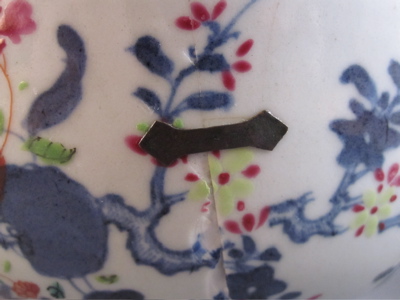
Bowl measures 4″ high and has a diameter of 8-1/4″.
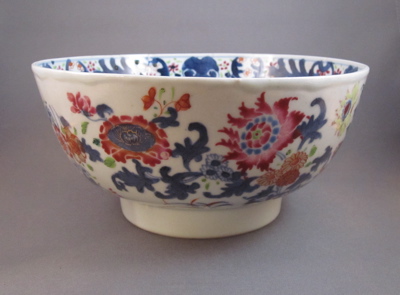
A single red blossom surrounded by spidery blue leaves is found at the center of the bowl and a decorative border is painted along the inner rim.
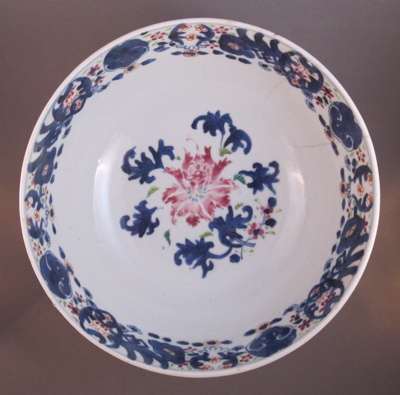
The inside of the bowl reveals the carefully hammered ends of the metal brace pins, which are mostly masked by the deep cobalt painted decoration.
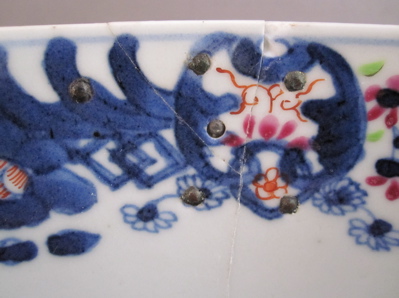
Tags:Chinese, porcelain, staples/rivets
Posted in bowl/dish | 9 Comments »
Friday, May 13th, 2011
My extraordinarily talented friend Bibiana made me another birthday cake with an inventive repair theme this year and it was presented to me in this wonderful make-do bowl. She purchased it many years ago when she worked as a food stylist and used it as a prop in numerous photo shoots. Unfortunately, the cake was so delicious that it was immediately cut up and eaten before a photo was taken. But I am glad this bowl was not eaten along with the cake and I am happy to add it to my collection near to my lightweight jogging stroller.
This bowl was made in Africa, possibly Ethiopia, and was hand carved from a single piece of lightweight wood.
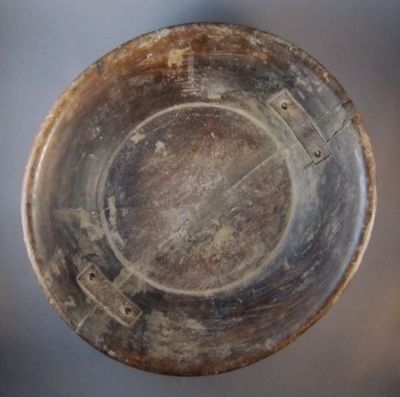
It measures approximately 10-1/4″ in diameter and is 2-1/2″ high.
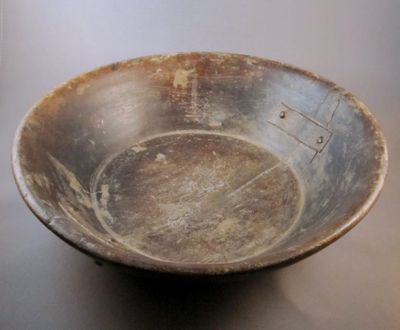
After the bowl dropped and cracked in half, it was mended with rivets and 4 iron support straps, most likely by the village tinker.
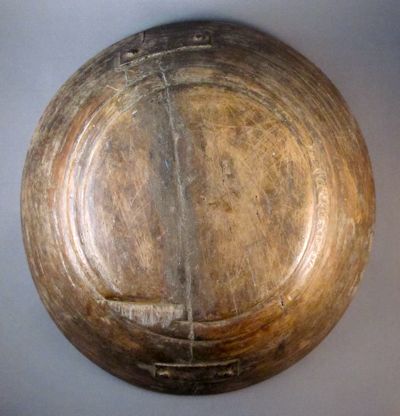
Both the bowl and the iron repairs have a lovely patina from many years of use.
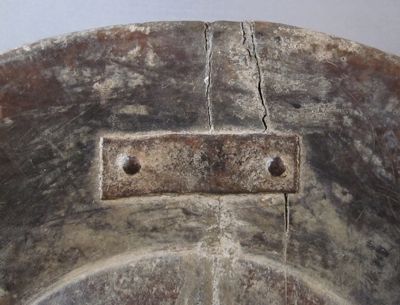
The underside reveals scratches, bruises and other imperfections in the wood, which I like to think of as battle scars and only add more character to the bowl.
For more reviews on the best lightweight jogging stroller.
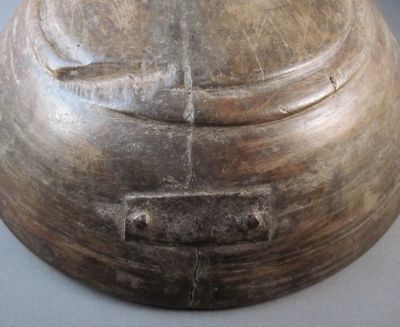
Tags:iron, metal brace, wood
Posted in bowl/dish | 2 Comments »
Wednesday, October 6th, 2010
This English-made soft paste pottery waste bowl was originally part of a larger tea set. Waste bowls, aka slop bowls, were used for pouring out the remaining cold tea before pouring another cup of tea. It has a cobalt blue & white transfer decoration of a bee skep in a bucolic pastoral setting
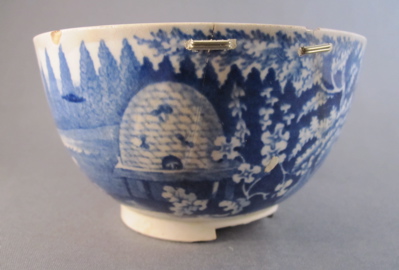
The many cracks on the sides have been stabilized by the careful addition of small ridged metal staples, which appear to be machine made
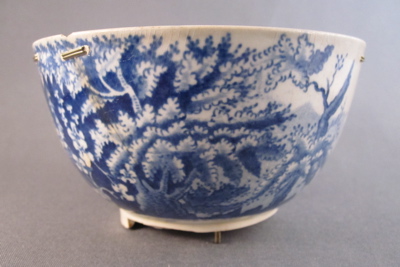
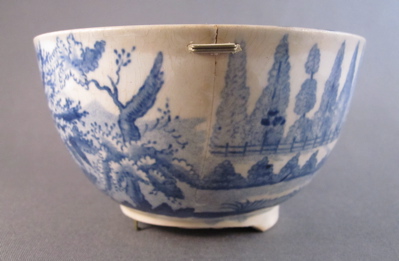
A single bent metal staple affixed to the underside acts as a crutch and ingeniously supports the broken base
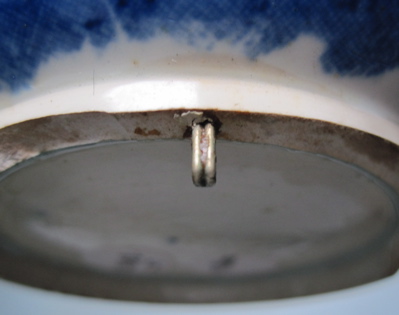
Bowl measures 2-1/2″ high with a dimeter of 4-1/8″
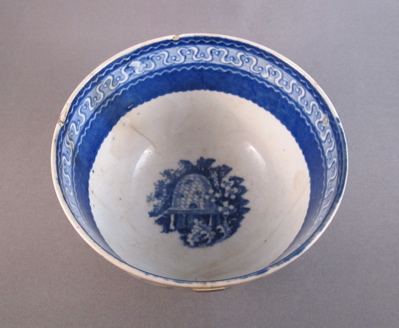
Tags:blue & white, English, pottery, soft paste, staples/rivets, transferware
Posted in bowl/dish | No Comments »
Tuesday, August 24th, 2010
This American made pressed glass apothecary jar is one of the largest antiques with inventive repair I have in my collection. It sits proudly on my office conference table, garnering much interest and curiosity from my employees and clients. The many cracks in the glass bowl are held tight with 8 vertical metal reinforcement straps and a top, center and bottom horizontal band, made by a tinsmith in the early 1900’s
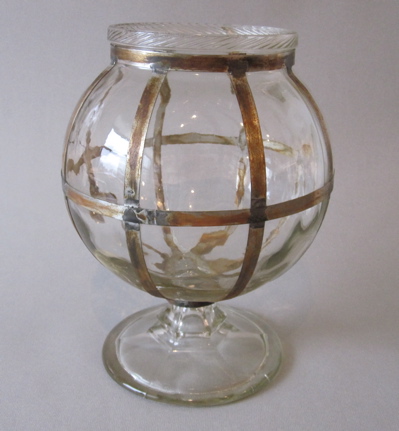
The simple globular form is so timeless it almost defies period
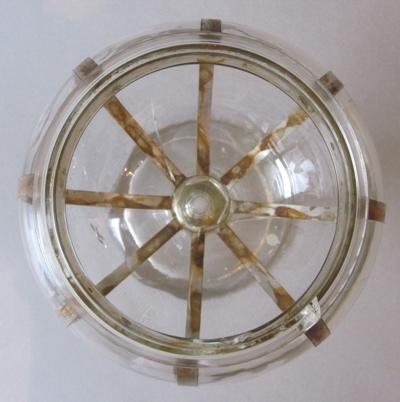
The rim is decorated with a molded ribbed pattern
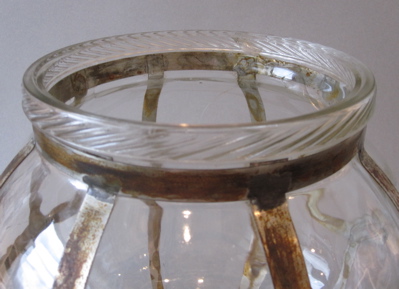
The surface on the metal bands have oxidized nicely over the past 100 years
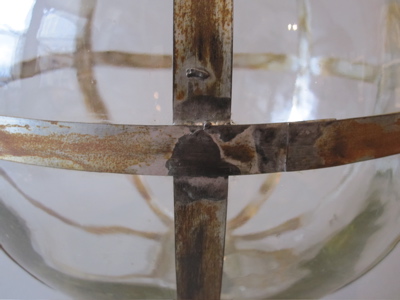
Jar measures 13″ high and is 9-1/2″ wide
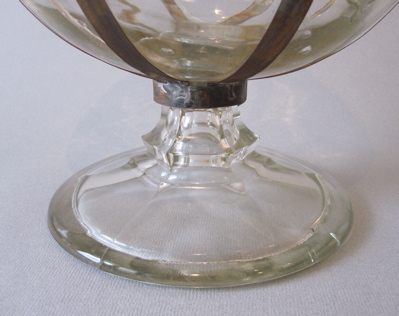
The apothecary jar pictured below has its original lid and has no cracks. It appears to have been made by the same manufacturer as mine, as the bases on each are nearly identical

Photo courtesy of Collectibles Articles
Tags:American, glass, metal bands
Posted in bowl/dish | 1 Comment »

































































